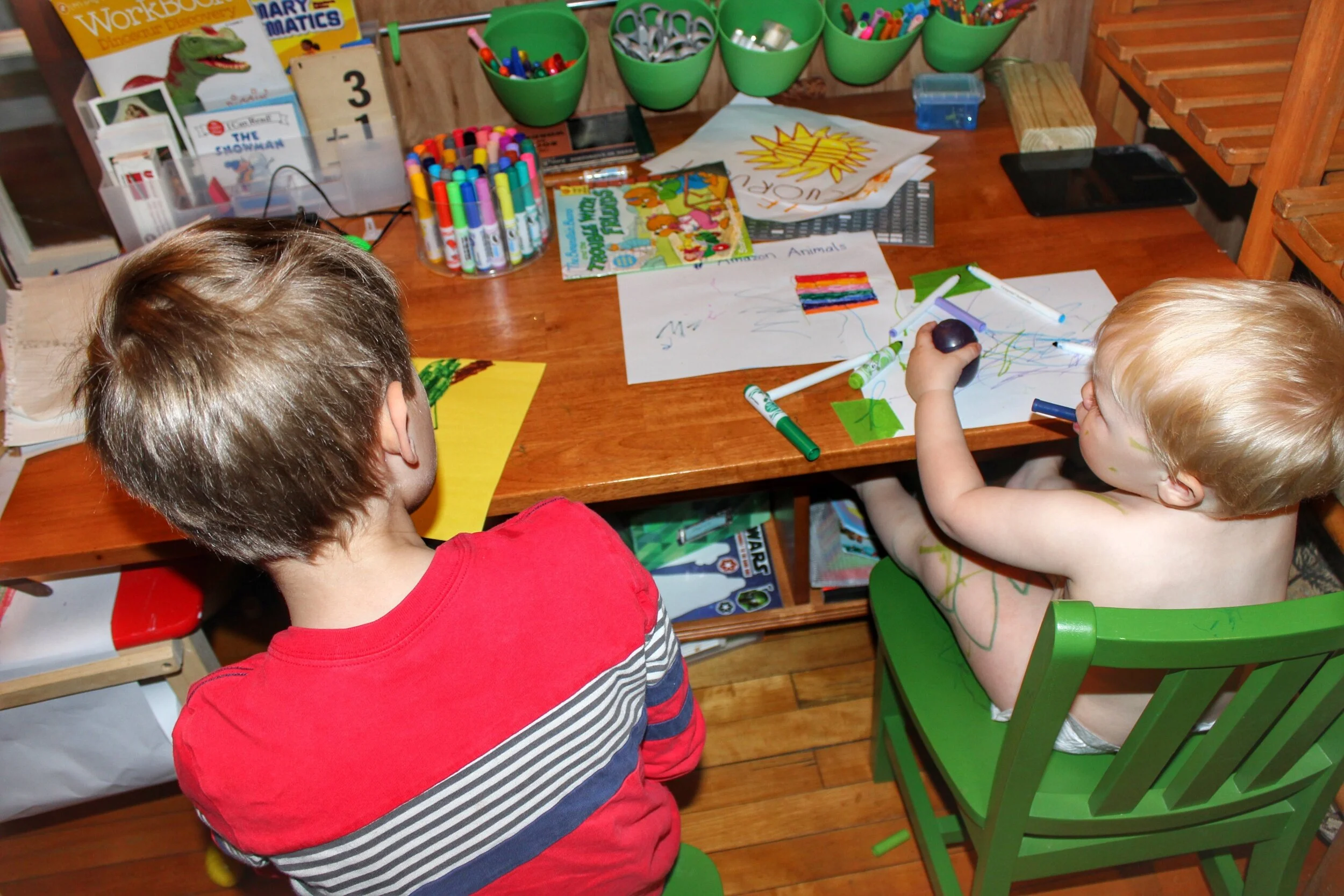The cabin in the woods where we lived and homeschooled in Harlan County, Kentucky
You may not know this about our family, but we spent two years literally living in a log cabin in the middle of the wilderness, where I homeschooled our oldest child through kindergarten and first grade (the youngest was an infant and toddler at the time). Doesn’t that feel like what we are all doing now? Suddenly we are all thrust in the role of the Swiss Family Robinson, stockpiling supplies with no school on the horizon.
Even as a veteran homeschooler, kids being out of school for a month is a major parenting challenge. The routine of getting up for school and participating in extracurriculars anchor us, often more than we realize. I bet a lot of us are imagining kids laying around on their devices and eating endless snacks while our homes getting more and more chaotic. It’s not what we want, but now is not the time for gold-star perfectionism, either. Right now we should aim to do a good enough job so that we can maintain a sense of normalcy and help our children feel safe and engaged—and so that they don’t totally lose all the skills they have learned this year in school. This is not about creating hundreds of activities, but about keeping the big picture in mind to establish some good routines at home that also allow for the reality of working parents and different caretakers.
Here are my plans and recommendations for the days ahead as the mother of a 4th grader and a preschooler:
Establish a routine
First day of 1st Grade for homeschool
I’ll be honest: not having to peel my kids out of bed at the crack of dawn is definitely the silver lining of school being cancelled. But I also know how much our family, as a unit, suffers when there is no routine. I will be implementing regular bedtimes and wakeup times, especially on the weekdays. Will I get them up at 8:30 instead of 7? Absolutely, but the trick is balance. We cannot let bedtime stretch so late that my husband and I won’t have a moment alone to decompress. Face it, bedtime will be more precious than ever. And bedtime will depend on when they get up.
We will also set times in the day for playing, eating, reading, exercise, and, yes, screen-time. Once these times are set, the rest is details, and can be led by one of us or a babysitter. Our children don’t need perfect learning activities that would get posted to Pinterest. Kids thrive on routine and consistency. Just remember that as soon as you let the routine slip, they will try and try again for that extra screen time. It’s human nature.
In setting the routine, make sure you think about yourself as well. I will be working from home, so I need set times in the day I know I can focus on work. I also need time to exercise and be by myself. My work times will, frankly, often be their screen time. Again, that is okay. This is not the time I need to experiment with going screen-free for a month. I just don’t want them to spend the entire day and evening on their devices, and I don’t want to spend an entire day giving my job half the attention it needs. We are all more productive for set time periods of clear focus.
Set Benchmarks
Goals are very motivating for kids, especially if meeting the goal stands between them and watching YouTube. For this reason, I am planning on sprinkling shorter sessions of screen time throughout the day because screen time is the greatest motivator at our house. Our oldest child will have to read a certain amount before he can have devices. Rooms will have to be cleaned up before they can go back on devices. They will have to work through the packets the school sends home to access further screen time. Lather, rinse, and repeat.
Covering the baby in scribbles may have been the goal for this day
Now is also a good time for a modest goal they can meet. Try something fun, like learning to tie their shoes, or making a certain number of baskets in a row in in your backyard basketball hoop. I want my oldest to learn how to make brownies on his own, and maybe spaghetti. It doesn’t all have to be academics to be learning. And whatever you do, make sure it is something that will not be frustrating. Being cooped up in the house while simultaneously torturing yourself with overly-ambitious goals is not wise. Stick to something small. You can always add more later.
Keep it Basic
No matter what, you got to read
You don’t need to do something overly complex for children to learn. Learning is all around us, all the time. If you do want to do something to help your child, reading needs to be practiced every single day. It might not seem exciting, but the research on reading is absolutely astounding. It is the gateway to learning all subjects and the only way to get better is to do it. For my 4th grader this means he needs specific times for independent reading, and for my preschooler that means that someone needs to read to him.
Of course, you also don’t want to make your kid hate reading in the 4 weeks they have off school. Every child has a different level of stamina for reading, just like they can all run for different distances. You may have a 5 year old who could stare at books for hours, or you might have a 11 year old who can barely stand to read and even 10 minutes is asking a lot. Follow your child’s lead to see how long they should read / be read to. 20 minutes is a good starting point. Try making yourself read as well during the day, and especially the books your kids are reading. Reading the same book gives you lots to talk about, and may even put some of our current events in perspective. Plus, endless news and Facebook is bad for all of us. Kids have an innate sense of fairness, and you making them read when you are staring at your phone may not go over well.
Did your library close before you could stock up on books? There are a lot of great online resources right now, including this one from Scholastic: https://classroommagazines.scholastic.com/support/learnathome.html?fbclid=IwAR2TaQ-EAIWCqq34cDrBtdcAu4FfU7Uw91GX1YBvF6z_tUHVX3gJeNsWyww
Don’t forget food and exercise
One of the biggest parts of establishing a routine will be figuring out snack times and exercise times. With extracurriculars cancelled, I know I will have to find clear and specific times to do physical activities. Again, for some kids this will be absolutely natural and others will need more prodding. The same thing goes for snacks: they should be eaten at set times, and only after washing hands. I will have to remind myself of this rule as I reach for a few chips while walking around. After all, maintaining good health should be a priority right now, and that means good eating, enough sleep, and exercise.
Keep Calm and Carry On
Nature is a great way to stay grounded and keep perspective
I know things are scary right now. Believe me, I do. My husband and two sons all carry a rare genetic defect that makes them very susceptible to respiratory distress, not to mention our own parents who are in fragile health. But what is most important right now is how we show our children how we handle times of distress. We will forge a new normal. We will still get out of the house in small ways, to go on hikes and bike rides and to patronize the small businesses that need us desperately right now. I will continue to take care of myself and my professional obligations, and it is important that they see me carrying on.
Right now, we can all take a deep breath and see a path forward. Praying helps me put things in perspective and to remember that it is not my job to worry or fear. Hang on to whatever it is that helps you see the big picture, whether it is baking or yoga or a walk by yourself. One day, this will be an important memory for our children, something they return to when facing life’s uncertainties. Let’s talk with them honestly and let them know that they don’t have to be scared, but we can all take some steps to care for each other. Right now we can be gentle on ourselves and focus on the big picture. We can think about caring for neighbors, caring for ourselves, and slowing down. And we can spend time with family in a way that feels thoughtful, even if it is imperfect. If these are some of the outcomes of this whole COVID-19 experience, we may find that we look back at it with gratitude. And we may even find that it was a terrific learning experience for our children, after all.





